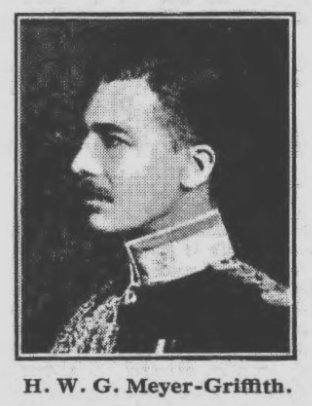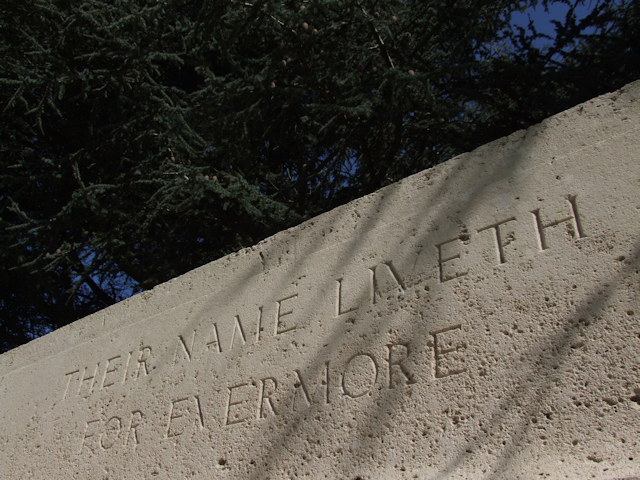Name
Harold Walter Gooch Meyer-Griffith
9 Aug 1878
Conflict
First World War
Date of Death / Age
28/05/1915
36
Rank, Service Number & Service Details
Major
The Loyal North Lancashire Regiment
Attached as Officer Commanding Lines of Communication to the Allied Forces (Cameroon)
Awards: Service Medals/Honour Awards
British War and Victory medals
Mentioned in Despatches, Croix de Guerre (France)
Cemetery/Memorial: Name/Reference/Country
FREETOWN MEMORIAL
Sierra Leone
Headstone Inscription
N/A
UK & Other Memorials
St Lawrence Church Memorial, Bovingdon, Memorial Plaque, Memorial Hall, Bovingdon
Pre War
Harold Walter Gooch Meyer Griffith was born on 9 Aug 1878 in Bovingdon, Herts and baptised on 23 Sep 1878 in Bovingdon, Hertfordshire, the only son of Walter Meyer and Helen Mary Griffith (nee George) (N.B. his birth is listed twice in the civil registration birth index under the same number, one as Harold Walter G Griffith and another as Myer [sic] Griffith, Harold W G).
His parents had married in London on 20 January 1876 and were living at the Old Vicarage, Bovingdon when he was born. Sadly his father died on 3 September 1879, aged 29 at Bovingdon and his mother gave her address as Richmond Lodge, Bognor at probate.
On the 1881 Census Harold was living with his widowed mother at 44 York Street, Marylebone, London.
He was educated at Dover College in Kent.
His home address was given as Test Lodge, Houghton near Stockbridge, Hampshire at the time of enlistment.
Wartime Service
His father and grandfather had both served in the military and at the outbreak of the South African War he applied for a commission and served as 2nd Lieutenant and later as Lieutenant in the South Wales Borderers between 1900 to 1902.
He was appointed Aide-de-Camp and Private Secretary to the Governor General, Sierra Leone in 1913 but resigned this position on the outbreak of WW1 and applied to be sent to the Front in France, however he was asked to stay in West Africa and served with the West African Frontier Force.
He was killed in action on 28 May 1915 when his supply column was ambushed near Wum Biagas, Cameroon, West Africa, by German forces and he led a charge to drive them off, for which he was Mentioned in Despatches (London Gazette 9 Dec 1916).
The extensive report in De Ruvigny's Roll of Honour reads as follows:
Harold was the only son of Walter Meyer-Griffith and his wife Helen Mary (née George). He was educated at Dover college. On the outbreak of the South African war he applied for a Commission and served as 2nd Lieut and later as Lieut with the 3rd South Wales Borderers. He was employed as Railway Staff Officer and Censor and afterwards attached to A.S. Corps. When later in the year 1900 the regiment moved up to Taungs in British Bechuanaland he was given the same posts there; after this he was attached to the ACS at Pretoria and from there was sent on to Middelburg, and then went north as supply officer to general Sir Bindon Blood, K.C.B., and after that, in the same capacity to columns under Col. Pulteney, D.S.O., Col. Lord Basing and others. He founded the supply depot at Frankfurt (Free State), having ere tracked all over the Transvaal and Swaziland; and for his services received the Queen's medal with three clasps, and the King's medal with two clasps, and was gazetted Hon. Lieut. in the Army 26 March 1902. He became Capt. Royal North Lancashire Special Reserve, 5 May 1909, and Major (Unattached List T.F.) 14 Aug. 1910, when officer commanding the OTC Glenalmond. He was appointed ADC and private secretary to the governor of Sierra Leone (Sir E.M. Merewether, K.C.V.O, C.M.G.) Nov. 1913.
On the outbreak of the European war he threw up his appointment and applied to the War Office to be sent to the front in France. Brigadier General C Dobell, however, on his arrival in Freetown, September 1914, being in need of officers, major Griffith accompanied the expedition for service with him in the Cameroons. He was appointed chief ordnance officer to the British force 12 September 1914, and during December he was in command of lines of communication, northern railway, and led several expeditions in the Bush, etc. In April, 1915, Major Griffith had arrived and formed a camp at Wum Biajas on the Mbila River. Furious fighting had been going on ahead for days and nights; the sick and wounded were continually coming to him. His lines of communication were cut behind him and several cyclist and runner messengers had been sniped at previously and had to return. The condition of things was serious, but on the 27th an orderly with a strong patrol of six men and a civilian, got through and no sign of the enemy. A very large convoy of sick and badly wounded – nine officers among them – was waiting to be evacuated to the base, so early on the morning of 28 May they moved out, a strong advance guard going on ahead nearly two hours earlier. Time passed, and Major Griffith, with his hands full of other duties, hoped all was well; but about 11 a.m. he received a message from the officer in charge of the convoy saying their advanced guard had been attacked and had retreated before the Germans, and that the convoy was trying to return; but the enemy were in great force. He was greatly upset at the idea of the convoy of invalids being in danger, and immediately decided to go himself to their rescue with all the available men he could take away from the Redoubt (about 40 British and French black troops). About a mile out he met the head of the convoy and saw them safely off on their way back to camp; he proceeded on with his little band of troops, picked up the “Advance Guard” that had retreated (about another 20 men) , and took them along with him. About a mile further on he came in touch with the enemy; fighting for about 1 1/2 hours, he drove them back over a mile along the road (dense Bush on either side). Coming to a slight clearance, he ordered a “Final volley”, and then “Fix bayonets” “Charge!”. He himself led the charge-even in advance of his Advance Guard-only, however, to fall mortally wounded when he had got about 12 paces. His body was unable to be moved owing to the ambulance men (native carriers) bolting. The following day a patrol went out and found a grave close to where he fell on which the German foe had pinned a small crop of palm leaves. His brother officers erected a large cross at the head of his grave, and every convoy that passed afterwards, British or French, saluted “the Beloved Major’s” resting place. The General in Command of the British troops wrote to his mother:
“There was no braver heart or one so well loved; his loss is irreparable; his noble death was worthy of his brave race and his ancestors. I enclose letters passing between me and the Officer Commanding the French troops; they may convey to you how sincerely he was appreciated and be some comfort to you in the future. I feel that I have lost not only a great friend but a most valuable assistant. The death of no other person could have caused such universal sorrow”, and again: “your son was one of those with whom it was a pleasure and a privilege to be associated, more especially in times such as we are now passing through. We make our first forward movement tomorrow, and I hope, ere this reaches you, that his grave will be once more within the British lines,” and again later: “the operations for the success of which he did so much and gave all he had to give, have fortunately now come to an end, and the country must ever remain deeply indebted to him and his brave comrades who have fallen in this part of tropical Africa. In the hearts of those among whom your son laboured his deeds will ever be bright, and his death, so unselfish and self-sacrificing, a fine example to us all.”
He organised many Cadet Corps, and was for three years Officer Commanding the OTC Glenalmond. He was one of Lord Roberts’ staunchest supporters of the National Service League, and had a letter of thanks from him for services rendered and Silver Medal for merit. Whilst in Kent he was Captain Commanding North Kent Troop Legion of Frontiersmen; was on the council of the imperial maritime league; vice president, Kent tariff reform league; vice chairman to essay London council Boy Scouts; held a medal of life membership Red Cross SoC of Japan; was honourable member of the league of mercy; commissioner of scouts at Sierra Leone, etc, etc. The French government awarded him the Croix de Guerre, for valour and valuable services in Cameroon (posthumously). He was a F.R.G.S., of the R.H.S., and of the S.A. of Scotland. He wrote many articles for the service papers, some plays for the NSL, etc, and tales for boys in magazines. Nearly every sketch published of the Cameroon campaign was also his work; even the original sketches of illustrations (six) word in “Times History of the Conquest of Cameroon”, etc, etc.
Additional Information
Probate was granted to his widow in London on 13 October 1915 with effects of £2110 17s.
Acknowledgments
Brenda Palmer, Derry Warners
Malcolm Lennox, Dick West, Jonty Wild



